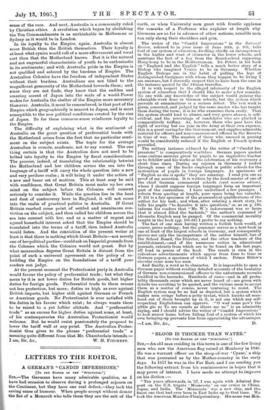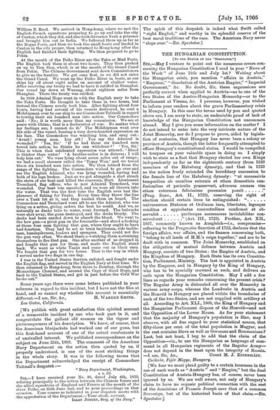Sin,—An old man residing in this town is one of
the few living men who saw the American flag raised at Monterey in 1846. He was a warrant officer on the sloop-of-war Cyane,' a ship that was presented us by the Mother-country in the early days. In 1857 he was in the Far East, and I am sending you the following extract from his reminiscences in hopes that it may prove of interest. I have made no attempt to implove on his diction :—
"Ten years afterwards, in '57, I was again with Admiral Du- pont on the U.S. frigate 'Minnesota' on our cruise in China, Japan, and India. The 'Minnesota' was a new ship, and the finest one that had ever been in East India up to that time, ,We took the American Minister-Plenipotentiary. His name was Hdh.
of Canton, which they did, and also took Governor Yeah a prisoner and brought him out to India. We followed them up as far as the Bogue Forts, and then we took the small boats and landed in Canton in the city proper, than returned to Hong-kong after the English had finished their fighting. We then prepared to go to Pekin.
At the mouth of the Peiho River are the Taku or Mud Forts. The English took them in about two hours. They then pushed on up to Tien Sion, which is at the mouth of the Grand Canal
from Pekin. The Chinese Government sent down Commissioners to give us the treaties. We got ours first, so we did not enter
the Grand Canal We went up the Peiho River in boats, as our ships lay off about eight miles on account of shallow water. After receiving our treaty we had to have it ratified in Shanghai. Our vessel lay down at Wusung, about eighteen miles from Shanghai. There the treaty was ratified.
In 1859 Admiral Hope went in with the English navy to take the Taku Forts. He thought to take them in two hours, but instead the Chinese nearly took him. After fighting about four hours, having had several of his vessels destroyed, he sent a Midshipman over to our ship to see Commodore Tattnall in regard to towing their six hundred men into action. Our Commodore said : 'No; it is worth more than my commission. We are at peace with China; that is a declaration of war. No matter what my feelings are, I cannot do it.' The Midshipman went over
the side of the vessel, bearing a very down-hearted expression on his face. The Commodore was watching him, and sang out :
' Avast ! young man. Lay aft ! You say the Admiral is wounded ?" Yes, Sir.' 'If he had those six hundred men towed into action, he thinks he can withdraw P' Yes, Sir.'
This is when that celebrated expression was uttered : Blood is thicker than water." A brother-sailor is in distress ; I will help him out.' We were lying about seven miles out of range ; we had a small steamer called the Toney Wan,' and we towed those six hundred men into action. We then retired from the range of the fighting. The Commodore wished to go over and
see the English Admiral, who was lying wounded, having had
both of his legs broken. Just as we got alongside a shot struck the stern of our boat and killed the coxswain, Hart. Lieutenant Trenchard, flag officer, who is now Admiral Trenchard, was wounded. Our boat was smashed, and we were all thrown into the water. That was the first time the English ever had the pleasure of fishing for Yanks. Every time they threw the line over a Yank bit at it, and they hauled them on board. The Commodore and Trenchard went aft to see the Admiral, who was lying on a settee, giving orders the best he could. And we, as naturally as ducks take to water, went forward. The bulwarks were shot away, the guns destroyed, and the decks bloody. The decks had been sanded down to absorb the blood. We went to the bow gun—a pivot gun on the forecastle—and stood a-looking at those four men fighting that gun, where they ought to have had fourteen. They had to act as train tackleraan, side tackle- man, handspikeman, loaders and spongers. They could not fire the gun very often. We stood there a-watching them a-straining themselves to fire that gun. One after another of us dropped in and fought that gun for them, and made the English stand back. We went as white Yanks and came out as black ones. We fought that gun for two hours. That is the way in which I served under two flags in one day.
I was in the United States Service, enlisted, and fought under the English flag, and served in the English Navy at that time. We then returned to Hong-kong, from there to Bombay, through the Mozambique Channel, and around the Cape of Good Hope, and back to the United States, and got in just before the Civil War broke out."
Some years ago there were some letters published in your columns in regard to this incident, but I have not the files at hand, and so cannot say whether this account is essentially differ ent.—I am, Sir, &c., H. WARREN SMITH.
Los Gatos, California.
[We publish with great satisfaction this spirited account of a memorable incident by one who took part in it, and congratulate the gallant old seaman on the vigour and picturesqueness of his description. We knew, of course, that the American bluejackets had worked one of our guns, but this first-hand account of one of the actual combatants is of unrivalled interest. We published correspondence on the subject on June 25th, 1898. The comment of the American Navy Department on the action then quoted by us, if properly understood, is one of the most striking things in the whole story. It was in the following terms that the Department acknowledged the receipt of Commodore Tattnall's despatch :— "Navy Department, Washington, s. a. 59.
Sru,—I have received your No. 36, dated July 4th, 1859, relating principally to the action between the Chinese forces and the allied squadrons of England and France at the mouth of the river Poiho, on 25th June last, and to your proceedings on that occasion. Your course as indicated in your dispatch meets with the approbation of the Department.—Your obedt. servant,
ISAAC JONCEY, Secy. of the Navy." The spirit of this despatch is indeed what Swift called "right English," and worthy in its splendid reserve of the best naval traditions of the race. The American Navy never "slops over."—En..Speetator.1







































 Previous page
Previous page